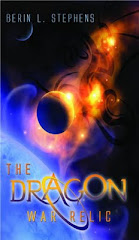This week, I've had an epiphany (isn't that such a cool word?). For the last several years, and more recently from my writing group, I've kept hearing about the need for character arcs. Well, I think I finally get it! (okay, so I'm a little slow)
I think one stumbling block I've had before this new realization is the old saying: character + problem = story. It's a very simple formula, and I like things that are simple (I'm very simple-minded), but I've come to the conclusion that this formula is too simple. True, it works, but what is it that makes a story stand out and stick with us? What makes a story great? I think I know the answer now, though as I continue to learn of this concept, that might change.
It's taken a combination of things to help me learn this. Most recently, my writing group (with Bryan Beus and Steven Gashler, thanks guys) have been asking me what my characters' arcs are. I always had the brilliant answer of, "Idunno." Wasn't it just good enough that my character was stuck into some insurmountable situation and we get to see them figure a way out? Well, it does work to create a "fun" story, and there are plenty of books and movies that follow this formula. But is it even necessary to make some kind of philosophical statement, too? Probably not, but isn't it also nice to write a story that sticks with people and causes them to want to read more of what you have? Most definitely. And we do this with the arcs.
Lately, during my morning exercise bike routine, I've been rewatching my Babylon 5 DVDs. This series has always stood out to me and until now I didn't quite know why. Actually, a couple of episodes I've recently watched stood out as good and bad examples of what I mean. In season 4, there was an episode called "Intersections in Real Time." It's where Captain Sheridan is being held prisoner. To make a long story short, the end of the episode finished with him in the exact same position he had started. I let out an audible groan when it was over. I couldn't believe I had sat through (actually, I pedaled) that whole thing. What a waste of time!
Towards the beginning of Season 5, there was another episode called, "The Long Night of Londo Mollari." I groaned as it started. This episode did not have any fancy explosions or high excitement.We got to spend most of the episode inside the dying brain of Londo. How boring could that be? It actually ended up being a great episode. Why? Because Londo made a journey and came to the other end of it a changed person.
Another reason I think I've always gravitated toward simple "character with problem" stories is because most of our television series do this. Characters might make a small arc during one episode, but by the next week they were all reset back to square one. Very seldom do we see series characters learn and change. That is why a couple of my favorite shows have been Babylon 5 and Star Trek: Deep Space 9. I could go on about this, but I won't for now.
Now, the third thing that has helped me on my quest to understand this is the Save the Cat! series of books by Blake Snyder. I'll do another blog about this later, but in Blake's beat sheet (outlining) method, he builds in the concept of character change. He points out that what resonates with the audience is not only the A story (plot - the sequence of events) but also a B story that contains some form of spiritual lesson. I'll probably go into this more in my next blog.
Okay, so now the old formula is all messed up. Since I really like formulas, though, I've been trying to come up with a new one. How about this: Character (from beginning of story) divided by Situation That Forces Change equals Character (at end of story). Or, more succinctly: CharB / Change = CharE. Hmm, maybe it needs to be inserted into the quadratic formula somehow.
So, what I think I've learned is that stories are not about fancy worlds or great action sequences, though those are fun, but they are about exploring the human condition in order to see how people learn and grow. I'd appreciate any thoughts others have on this, and other "formulas" for fiction. I'm not sold on my formula being the right one, but it's a place to start. Please feel free to leave a comment.

1 comment:
I horrible at leaving comments, but like you I've learned that character arcs are very important. I wonder if you would agree that Batman: Dark Knight has a good character arc. And with your new formula could you break that movie down?
Post a Comment